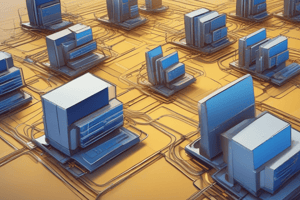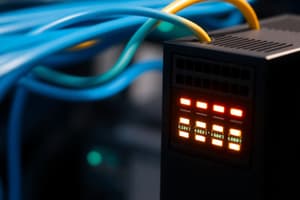Podcast
Questions and Answers
Considering the primary factors for choosing network media, which scenario would MOST likely lead to selecting fiber-optic cables?
Considering the primary factors for choosing network media, which scenario would MOST likely lead to selecting fiber-optic cables?
- A short-distance connection in a home network with limited devices.
- A temporary network setup requiring quick and easy installation without concern for long-term performance.
- A small office environment requiring low bandwidth and minimal installation costs.
- A large data center needing high-speed data transmission over long distances. (correct)
In a scenario where a business requires network connectivity in a building with significant electromagnetic interference, which network media would be the MOST suitable?
In a scenario where a business requires network connectivity in a building with significant electromagnetic interference, which network media would be the MOST suitable?
- Coaxial copper cable
- Fiber-optic cable (correct)
- Wireless (Wi-Fi)
- Unshielded twisted pair (UTP) copper cable
When selecting network media, what is the MOST important consideration when evaluating the 'amount of data and speed' requirement?
When selecting network media, what is the MOST important consideration when evaluating the 'amount of data and speed' requirement?
- Ensuring the media can support the current data needs, without considering future growth.
- Selecting a media type capable of handling current and anticipated future bandwidth demands. (correct)
- Choosing the cheapest media option to minimize initial costs.
- Prioritizing ease of installation over data transmission capabilities.
A company is setting up a network in a historical building where running new cables is difficult and expensive due to structural limitations. Which network media would offer the MOST practical solution, balancing cost, installation complexity, and performance?
A company is setting up a network in a historical building where running new cables is difficult and expensive due to structural limitations. Which network media would offer the MOST practical solution, balancing cost, installation complexity, and performance?
In designing a network for a large outdoor area, such as a college campus, what factor related to distance MOST influences the choice between copper, fiber, and wireless media?
In designing a network for a large outdoor area, such as a college campus, what factor related to distance MOST influences the choice between copper, fiber, and wireless media?
Which statement accurately describes the relationship between hosts, clients, and servers in a network?
Which statement accurately describes the relationship between hosts, clients, and servers in a network?
What is the primary purpose of an IP address in network communication?
What is the primary purpose of an IP address in network communication?
A computer is running both web server software and a web browser. What role(s) is this computer taking on?
A computer is running both web server software and a web browser. What role(s) is this computer taking on?
In a peer-to-peer network, what is the function of a computer that is directly connected to a printer via USB and also connected to the network?
In a peer-to-peer network, what is the function of a computer that is directly connected to a printer via USB and also connected to the network?
Which of the following scenarios best describes a client-server relationship?
Which of the following scenarios best describes a client-server relationship?
A small office needs to set up a network for file sharing and printing without a dedicated server. Which type of network is most suitable?
A small office needs to set up a network for file sharing and printing without a dedicated server. Which type of network is most suitable?
A user is simultaneously using a web browser, an email client, and an instant messaging application. How many client software programs are being used?
A user is simultaneously using a web browser, an email client, and an instant messaging application. How many client software programs are being used?
What is a key characteristic that differentiates a host from other network devices like routers or switches?
What is a key characteristic that differentiates a host from other network devices like routers or switches?
Which scenario would most likely benefit from a peer-to-peer network?
Which scenario would most likely benefit from a peer-to-peer network?
A home network user notices significantly reduced internet speed when another user is simultaneously downloading large files. What is the most likely cause in a peer-to-peer network environment?
A home network user notices significantly reduced internet speed when another user is simultaneously downloading large files. What is the most likely cause in a peer-to-peer network environment?
In a network, what is the primary function of an end device?
In a network, what is the primary function of an end device?
Consider a network with a broken link between two intermediary devices. Which function of intermediary devices would be most crucial in maintaining network connectivity?
Consider a network with a broken link between two intermediary devices. Which function of intermediary devices would be most crucial in maintaining network connectivity?
A network administrator wants to prioritize video conferencing traffic over email traffic. Which function of intermediary devices would they utilize?
A network administrator wants to prioritize video conferencing traffic over email traffic. Which function of intermediary devices would they utilize?
Which type of network media is LEAST susceptible to electromagnetic interference?
Which type of network media is LEAST susceptible to electromagnetic interference?
A company is setting up a new office and needs to choose a network media. They require high bandwidth and secure data transmission over a long distance. Which media would be the BEST choice?
A company is setting up a new office and needs to choose a network media. They require high bandwidth and secure data transmission over a long distance. Which media would be the BEST choice?
What is a primary disadvantage of peer-to-peer networks in terms of security?
What is a primary disadvantage of peer-to-peer networks in terms of security?
Which of the following BEST describes the role of intermediary devices in a network?
Which of the following BEST describes the role of intermediary devices in a network?
An administrator is troubleshooting a network where data is not reaching its destination. Which intermediary device function should they investigate FIRST?
An administrator is troubleshooting a network where data is not reaching its destination. Which intermediary device function should they investigate FIRST?
Which characteristic of peer-to-peer networks makes them NOT scalable for large organizations?
Which characteristic of peer-to-peer networks makes them NOT scalable for large organizations?
In a scenario where security is paramount, which network topology would be MOST suitable?
In a scenario where security is paramount, which network topology would be MOST suitable?
What is the role of a repeater within intermediary devices?
What is the role of a repeater within intermediary devices?
Why is it important for intermediary devices to classify messages according to priority?
Why is it important for intermediary devices to classify messages according to priority?
What is the MOST important factor to consider when selecting a network media type for a new network installation?
What is the MOST important factor to consider when selecting a network media type for a new network installation?
Flashcards
Hosts
Hosts
Devices that connect to a network and participate in communication.
IP Address
IP Address
A unique numerical address that identifies a host on a network.
Servers
Servers
Provide information, like email or web pages, to other devices on the network.
Clients
Clients
Signup and view all the flashcards
Web Browser
Web Browser
Signup and view all the flashcards
Peer-to-Peer Network
Peer-to-Peer Network
Signup and view all the flashcards
Print Sharing PC
Print Sharing PC
Signup and view all the flashcards
Network Interface Card (NIC)
Network Interface Card (NIC)
Signup and view all the flashcards
Maximum Distance
Maximum Distance
Signup and view all the flashcards
Installation Environment
Installation Environment
Signup and view all the flashcards
Data and Speed Needs
Data and Speed Needs
Signup and view all the flashcards
Media and Installation Cost
Media and Installation Cost
Signup and view all the flashcards
Advantages of peer-to-peer
Advantages of peer-to-peer
Signup and view all the flashcards
Disadvantages of peer-to-peer
Disadvantages of peer-to-peer
Signup and view all the flashcards
End Devices
End Devices
Signup and view all the flashcards
Device address
Device address
Signup and view all the flashcards
Intermediary Devices
Intermediary Devices
Signup and view all the flashcards
Intermediary device functions
Intermediary device functions
Signup and view all the flashcards
Repeater
Repeater
Signup and view all the flashcards
Examples of intermediary devices
Examples of intermediary devices
Signup and view all the flashcards
Network Media
Network Media
Signup and view all the flashcards
Types of Network Media
Types of Network Media
Signup and view all the flashcards
Metal wires data transmission
Metal wires data transmission
Signup and view all the flashcards
Fiber optic cable data transmission
Fiber optic cable data transmission
Signup and view all the flashcards
Wireless transmission
Wireless transmission
Signup and view all the flashcards
Criteria for choosing network media
Criteria for choosing network media
Signup and view all the flashcards
Study Notes
- To participate in a global online community, a device needs to connect to a network, which in turn connects to the internet.
Host Roles
- Hosts are any computers connected to a network that directly participate in network communication.
- Hosts are also known as end devices.
- Hosts are assigned a number called an Internet Protocol (IP) address for communication purposes.
- The IP address identifies the host and the network it's connected to.
- Servers are computers using software to provide information, such as email or web pages, to other end devices.
- Each service requires separate server software such as web server software.
- A single server can provide services to many clients simultaneously.
- Clients are a type of host that use software to request and display information from servers.
- Client software examples include web browsers like Chrome or Firefox.
- A single computer can run multiple types of client software at once.
Peer-to-Peer
- Client and server software can run on separate computers or on the same one.
- Peer-to-peer networks involve computers functioning as both servers and clients, common in small businesses and homes.
- Advantages of peer-to-peer networks:
- Easy to set up and less complex.
- Lower cost due to not requiring dedicated servers.
- Suitable for simple tasks like file transfer and printer sharing.
- Disadvantages of peer-to-peer networks:
- Lack of centralized administration, making management difficult.
- Less secure compared to client-server models.
- Not easily scalable as the network grows.
- Performance can be slowed down as devices act as both clients and servers.
End Devices
- End devices are the network components most familiar to users.
- Each end device has a unique address to distinguish it from others on the network.
- When an end device starts communication, it uses the destination end device's address to specify where to send the message.
- An end device can be either the source or the destination of a message transmitted over the network.
Intermediary Devices
- Intermediary devices connect individual end devices to the network.
- They also connect multiple networks to form an internetwork.
- These devices ensure data flows correctly across the network.
- Intermediary devices use the destination end device's address and network interconnection data to determine the path for messages.
- Common intermediary devices include:
- Wireless routers
- LAN switches
- Routers
- Multilayer switches
- Firewall appliances
- Intermediary network devices functions:
- Regenerating and retransmitting communication signals to maintain signal strength.
- Maintain information about network and internetwork pathways.
- Notifying devices of errors and communication failures.
- Directing data along alternate pathways during link failures.
- Classifying and directing messages based on priority.
- Permitting or denying data flow based on security settings.
- Ethernet hubs are also known as multiport repeaters which regenerate and retransmit communication signals
Network Media
- Data transmits across a network via network media.
- The media provides the channel for messages to travel from source to destination.
- Three primary types of media for interconnecting devices:
- Metal wires within cables, where data is encoded as electrical impulses.
- Glass or plastic fibers within cables (fiber-optic cable), where data is encoded as pulses of light.
- Wireless transmission, where data is encoded via modulation of specific electromagnetic wave frequencies.
- Four main criteria for choosing network media:
- Maximum distance the media can carry a signal successfully.
- The environment in which the media will be installed.
- The amount of data and the required transmission speed.
- The cost of the media and its installation.
Studying That Suits You
Use AI to generate personalized quizzes and flashcards to suit your learning preferences.




